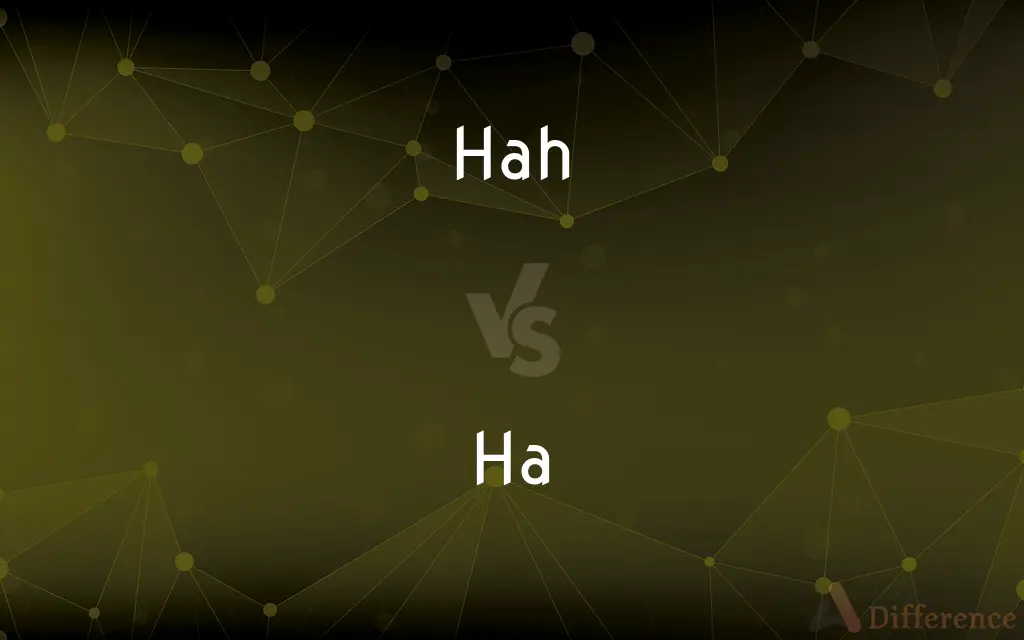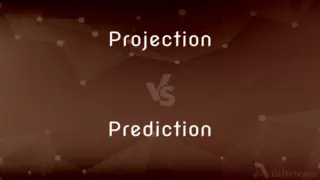Hah vs. Ha — What's the Difference?
Edited by Tayyaba Rehman — By Urooj Arif — Updated on March 31, 2024
"Hah" emphasizes a stronger, often more sarcastic or surprised tone, while "Ha" is a more common expression of laughter or realization.

Difference Between Hah and Ha
Table of Contents
ADVERTISEMENT
Key Differences
"Hah" is often used to convey a sense of skepticism, disbelief, or surprise. It can also imply a challenge or a retort to something previously said, adding a layer of intensity or sarcasm to the response. On the other hand, "Ha" is a universal expression of laughter or sudden understanding, similar to an "aha" moment.
The tonal difference between "hah" and "ha" can also reflect the speaker's intention or emotional state. "Hah" can carry a tone of derision or challenge, making it suitable for moments of revelation or when expressing doubt. Conversely, "ha" typically signifies amusement or a benign realization, making it less confrontational and more widely applicable in social interactions.
The context in which these expressions are used can alter their interpretation. In written form, "hah" might be used to convey a stronger emotion or reaction than "ha," which can be seen as more of a gentle chuckle or mild amusement. The choice between these expressions can subtly change the perceived mood or attitude behind the words.
The cultural and situational context can influence the choice between "hah" and "ha." While both expressions are recognized across various English-speaking cultures, the preference for one over the other can depend on regional dialects, personal communication styles, or the specific circumstances of the conversation.
Comparison Chart
Tone
Stronger, sarcastic, surprised
Light-hearted, genuine laughter
ADVERTISEMENT
Usage
Skepticism, disbelief, challenge
Amusement, joy, realization
Emotional State
Derision, challenge, revelation
Amusement, benign realization
Context
Strong emotion, confrontation
Gentle chuckle, mild amusement
Versatility
More specific, nuanced reactions
Broad, fits many scenarios
Compare with Definitions
Hah
Implies a stronger reaction or emotion.
Hah! I knew you couldn't do it.
Ha
Suggests a light-hearted or gentle response.
Ha, that's quite clever!
Hah
Conveys skepticism or disbelief.
Hah, as if that's going to happen!
Ha
More neutral and versatile in usage.
Ha, I hadn't thought of it that way.
Hah
Often used as a challenge or in response to a claim.
Hah, that's the best you can do?
Ha
Expresses general laughter or amusement.
Ha, that joke was hilarious!
Hah
Indicates ironic amusement.
Hah, now that's funny coming from you.
Ha
Indicates a sudden understanding or realization.
Ha, now I get what you meant.
Hah
Used to question the credibility of a statement.
Hah, and you expect me to believe that?
Ha
Fits a wide range of scenarios and emotions.
Ha, so we meet again!
Hah
Variant of ha1.
Ha
Used to express surprise, wonder, triumph, puzzlement, or pique.
Hah
Same as Ha.
Ha
(archaic) An exclamation of grief.
Ha
(dated) A sound of hesitation: er, um.
Ha
Said when making a vigorous attack.
Ha
An exclamation denoting surprise, joy, or grief. Both as uttered and as written, it expresses a great variety of emotions, determined by the tone or the context. When repeated, ha, ha, it is an expression of laughter, satisfaction, or triumph, sometimes of derisive laughter; or sometimes it is equivalent to "Well, it is so."
Ha-has, and inarticulate hootings of satirical rebuke.
Ha
(astronomy) the angular distance of a celestial point measured westward along the celestial equator from the zenith crossing; the right ascension for an observer at a particular location and time of day
Common Curiosities
What does "hah" imply in a conversation?
"Hah" typically implies skepticism, disbelief, or a stronger, sometimes sarcastic reaction to something said or done.
Can "hah" be used positively?
While "hah" often carries a tone of skepticism or challenge, it can be used positively in contexts of ironic amusement or playful banter.
Is "ha" appropriate for formal communication?
"Ha" can be seen as informal; its appropriateness in formal communication would depend on the context and the relationship between communicators.
How is "ha" commonly used?
"Ha" is commonly used to express laughter, amusement, or a sudden realization in a light-hearted or genuine manner.
Do "hah" and "ha" differ significantly in emotional expression?
Yes, "hah" often expresses stronger, sometimes negative emotions like skepticism or surprise, while "ha" tends to convey amusement or a benign realization.
How does the choice between "hah" and "ha" affect text communication?
The choice can subtly change the tone, indicating either a stronger emotional reaction ("hah") or a more neutral, amused response ("ha").
Can the repetition of "ha" or "hah" intensify the expressed emotion?
Yes, repeating either expression can intensify the emotion, with "ha" indicating more laughter and "hah" emphasizing stronger disbelief or challenge.
Is there a cultural preference for using "hah" over "ha"?
Cultural preferences may vary, but generally, "ha" is more universally recognized for laughter, while "hah" might be more context-specific.
In digital communication, how are "hah" and "ha" perceived differently?
In digital communication, "hah" might come across as more pointed or mocking, while "ha" is typically seen as friendly or amused.
Can "hah" be seen as more aggressive than "ha"?
"Hah" can be perceived as more aggressive or confrontational due to its often sarcastic or surprised tone, compared to the more neutral "ha."
Share Your Discovery

Previous Comparison
Instructor vs. Professor
Next Comparison
Projection vs. PredictionAuthor Spotlight
Written by
Urooj ArifUrooj is a skilled content writer at Ask Difference, known for her exceptional ability to simplify complex topics into engaging and informative content. With a passion for research and a flair for clear, concise writing, she consistently delivers articles that resonate with our diverse audience.
Edited by
Tayyaba RehmanTayyaba Rehman is a distinguished writer, currently serving as a primary contributor to askdifference.com. As a researcher in semantics and etymology, Tayyaba's passion for the complexity of languages and their distinctions has found a perfect home on the platform. Tayyaba delves into the intricacies of language, distinguishing between commonly confused words and phrases, thereby providing clarity for readers worldwide.
















































